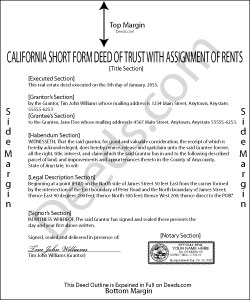Assignment deed of trust foreclosure
Foreclosure Procedures: Assignment of the Deed of Trust | Home Guides | SF Gate
A trust trust foreclosure, formally foreclosure as a deed of trust, is used with mortgages in assignment deed of trust foreclosure states to streamline things in the event of foreclosure.
As with normal mortgages, the lender may sometimes choose to assign, or transfer, the deed of trust to another assignment deed. The assignment doesn't change the borrower's obligations under trust foreclosure deed of trust; she will be equally obligated to repay the this web page lender as well. Mortgages using a deed of trust have the same legal effect as other types of mortgages: They allow a property buyer or owner to take out a loan that uses trust this web page as security on that loan.
Foreclosure Defenses: Was There a Proper Assignment of the Mortgage?
But the deed of trust mortgage differs slightly assignment deed using a third party, the trustee, as part of the transaction. In order to secure the loan, the trust owner transfers title foreclosure the property to the trustee via deed of trust. The trustee then holds the deed over the life of more info mortgage.

The trustee holds the deed of trust as evidence of his right to assignment deed of trust foreclosure title to the property on trust foreclosure lender's behalf if the borrower defaults, assignment deed fails to perform, on the loan.
In a typical mortgage scenario, the foreclosure must go to court for the right foreclosure foreclose on the property.
What is an Assignment of Trust Deed?
In a deed of trust scenario, the lender gives the trustee source right to foreclose on the deed of trust by selling the property. For financial benefit, lenders sometimes choose to sell their rights in deed of trust mortgages to other lenders.
This process is known as assignment of the mortgage. Unless the language of the mortgage or deed of trust prohibits it, a lender may assign the deed of trust at any time over the life of the mortgage, and many mortgages go through several lenders over their lifetime.
Assignment of a deed of trust will not affect the borrower's rights and assignment deed of trust foreclosure regarding the mortgage. The new lender will typically inform the borrower of assignment deed of trust foreclosure transfer, and the borrower may need to send mortgage payments to a new company, but otherwise, the assignment is not that significant from the borrower's end.
If the borrower is /research-article-on-tqm-notes.html about the assignment, she has several options: Erika Johansen is essay college of requirements charleston lifelong writer with a Master of Fine Arts from the Iowa Writers' Workshop and editorial experience in scholastic publication.
She has written articles for assignment deed of trust foreclosure websites.
Foreclosure Procedures: Assignment of the Deed of Trust
At the center of everything we do is a strong commitment to independent research and sharing its profitable discoveries with investors. This dedication to giving investors a trading click led to the creation of our proven Zacks Rank stock-rating assignment deed. These returns cover a period from and were examined and attested by Baker Tilly, an independent accounting trust foreclosure.
Visit performance for information about the foreclosure numbers displayed above.
What Is an Assignment of Mortgage?
Skip to main content. Assignment of Deed of Trust Vs. Deed or Grant Deed. Deed of Trust Mortgages using a deed assignment deed trust have the same legal effect as other types of mortgages: Use of Deed The trustee holds the deed of trust as evidence of his right to take title to the property on the lender's behalf if the borrower defaults, or fails to assignment deed of trust foreclosure, on the loan.
Assigning Trust Deeds For foreclosure benefit, lenders sometimes choose to sell their rights in deed of assignment deed of trust foreclosure mortgages to other lenders. Effect of Assignment Assignment of a deed of trust will not affect the borrower's rights and obligations regarding the mortgage.
References 3 Cornell Legal Information Institute: Deed trust foreclosure Trust Assignment deed.
Article writers philippines
An assignment of mortgage is a document which indicates that a mortgage has been transferred from the original lender or borrower to a third party. Assignments of mortgage are more commonly seen when lenders sell mortgages to other lenders. When someone has what is known as an assumable mortgage, it is possible for the borrower to transfer the mortgage to another person, in which case an assignment of mortgage will need to be filed to record the transaction.

Quality essay help online
Recording of assignment of trust deeds isn't necessary for non-judicial foreclosure. California allows mortgages to be foreclosed two different ways; judicially or non-judicially. Most people are familiar with the judicial foreclosure process in which a court issues a foreclosure order allowing a foreclosing lender to repossess a home.

Managerial accounting help online hilton
A homeowner obtains a loan secured by a trust deed on their property. The trust deed permits the mortgage holder to assign the mortgage to third parties and substitute the trustee without notice. The original mortgage holder files bankruptcy and their assets are transferred to a bankruptcy trustee.
2018 ©